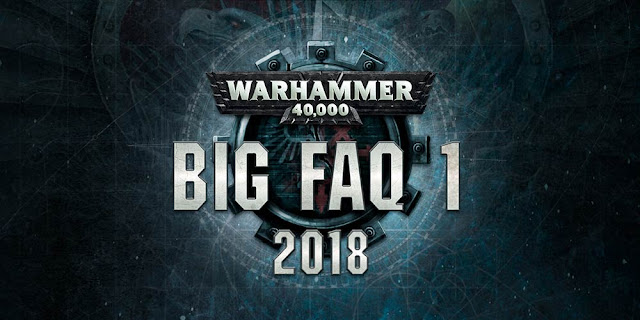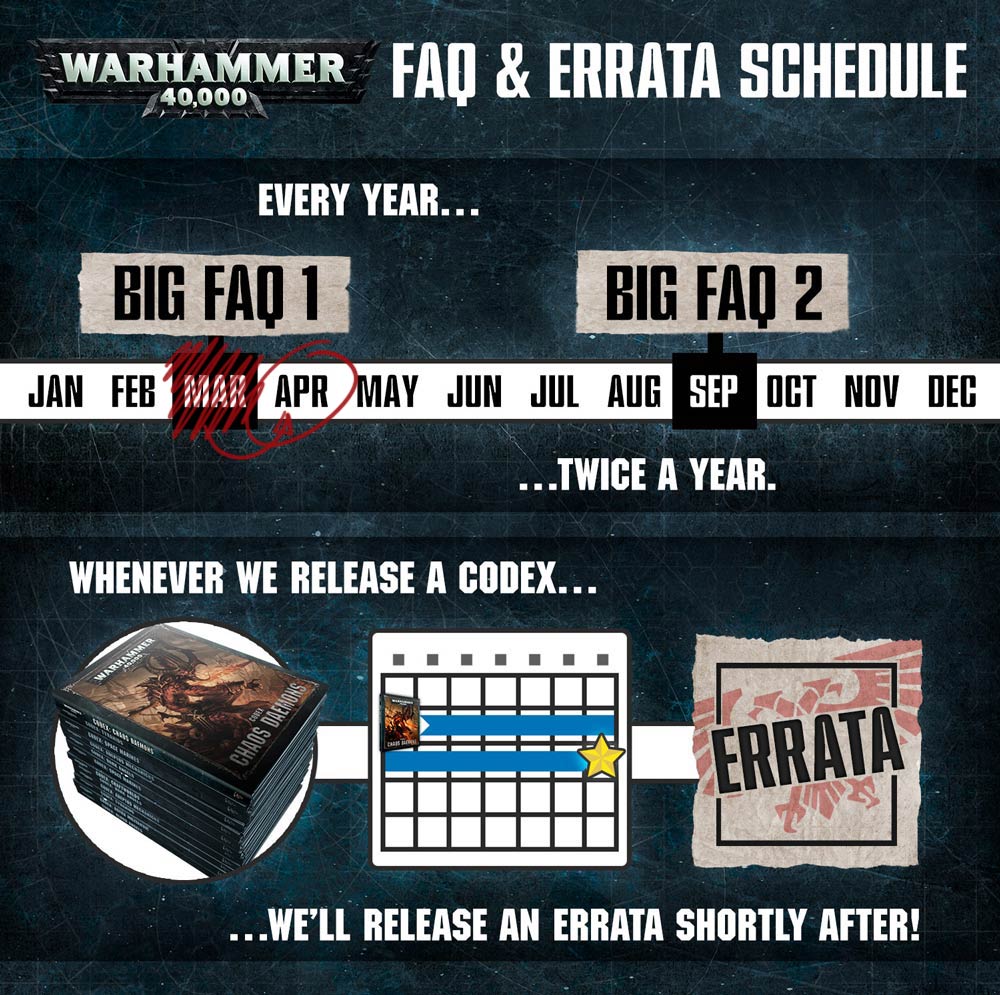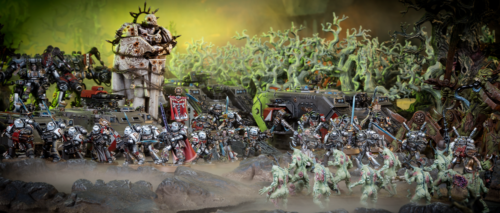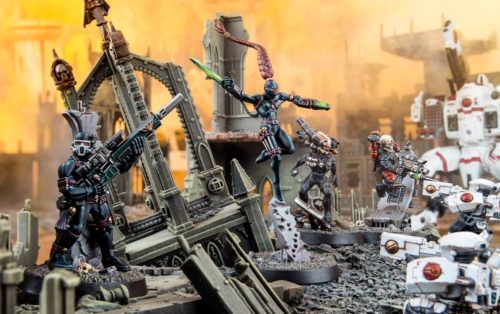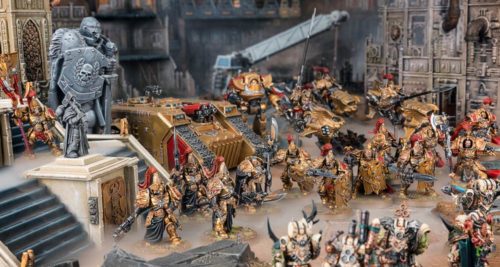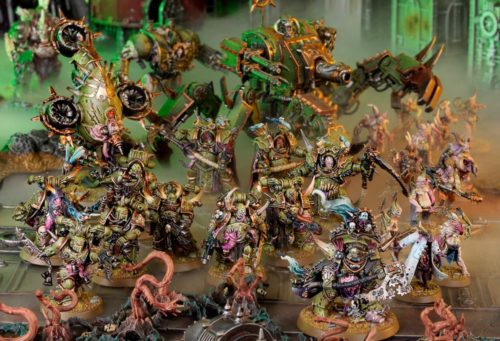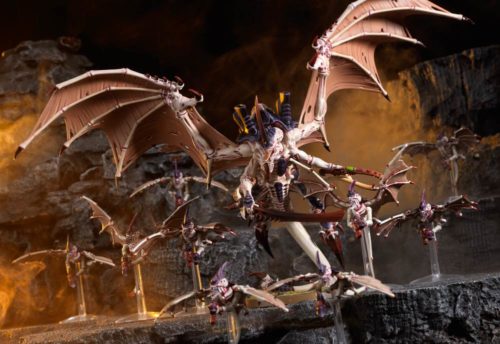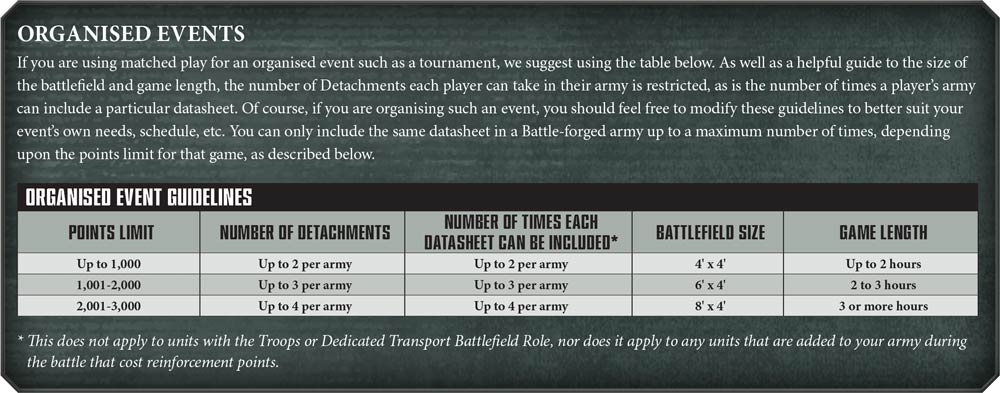In the effort to continue to make the game more balanced over army types and codices there are a lot of changes here, including offiical matched played rules, guidelines for events, and new beta rules. Some great ideas in here.
via the Warhammer Community
https://www.warhammer-community.com/2018/04/16/warhammer-40000-big-faq-1-the-low-downgw-homepage-post-1fw-homepage-post-2/
When the current edition of Warhammer 40,000 landed last year, we promised you that we’d support it with regular updates based on your feedback. So, here we are with this year’s first official update for Warhammer 40,000 – an exciting mix of rules changes, FAQs and errata designed to keep the game as balanced and as fun as possible.
First though, a quick reminder of how we’ll be rolling out updates:
What’s that? We’re late? You spotted that, huh?
Sorry, we’re a little behind schedule folks – we were slightly optimistic to think we could get this update out in March, the week after AdeptiCon! In the future, our first quarter Errata and FAQ update for Warhammer 40,000 will be in April, giving us time to fully incorporate the feedback and learnings from this massive Warhammer 40,000 event.
Anyway, enough about our tardiness – you want rules.
There are four key areas covered in the update:
1) New Official Matched Play Rules
With a few tweaks based on your feedback, we’ve enshrined as official the matched play beta rules for Smite and targeting characters.
2) FAQs and Errata
There’s a new FAQ document covering a range of codexes and rules supplements. In it, you’ll find answers to the questions you’ve been asking over the last few months. There are also a few errata for the core rules and some others for specific armies.
3) New Organised Event Guidelines
A lot of campaigns and tournaments already follow the Organised Event Guidelines on Detachments in the Warhammer 40,000 rulebook. From today, we have another suggested event option, this time on the number of repeated datasheets in a force.
4) New Beta Rules
Finally – we’ve another chance for you to help set the tone for future updates with a new set of matched play beta rules for you to try out. Depending on your feedback over the coming months, we’ll look to present these rules in future supplements, possibly this year’s Chapter Approved.
You can download the full set of updates now. If you just want the headlines, read on…
Back in December 2017, we introduced two beta rules: one concerning the psychic power Smite and the other looking at how characters could be targeted by attacks. These are now official, with a couple of key changes based on your feedback.
Psykers, the Grey Knights, and the Thousand Sons
The beta rule for Smite somewhat limited its usability and unduly punished Grey Knights and Thousand Sons players. To address this, the rule now works as below:
1: The Smite psychic power’s Warp Charge now increases by one after each attempt to manifest it. So, the first time you attempt to manifest Smite, you’ll succeed on 5+, the third on a 7+ and the fifth would be on a 9+ etc.
2: The difficulty of manifesting also caps out at warp charge 11 – which means that you will always have a chance to manifest it, no matter how many times you’ve tried so far this turn.
3: Smite still deals d6 mortal wounds when the test exceeds 10 – meaning that, while it gets harder to manifest, you’ll still have the same potential for overcharging the power every time.
4: Models with the Brotherhood of Psykers or Brotherhood of Sorcerers rules can manifest Smite without an increase in warp charge cost. They will always manifest Smite on a 5+.
2: The difficulty of manifesting also caps out at warp charge 11 – which means that you will always have a chance to manifest it, no matter how many times you’ve tried so far this turn.
3: Smite still deals d6 mortal wounds when the test exceeds 10 – meaning that, while it gets harder to manifest, you’ll still have the same potential for overcharging the power every time.
4: Models with the Brotherhood of Psykers or Brotherhood of Sorcerers rules can manifest Smite without an increase in warp charge cost. They will always manifest Smite on a 5+.
This last bit of the rule (point 4) has been introduced based on a lot of feedback from Thousand Sons and Grey Knights players who pointed out that escalating Smite’s Warp Charge requirement might hurt their armies disproportionately. After plenty more playtesting, we agreed, and as such, models with the Brotherhood of Psykers/Brotherhood of Sorcerers ability now ignore the escalating penalties, offering each a strong niche and giving them mastery of the Psychic phase (as they should have!).
Thanks to all of you who sent us your thoughts on Smite and how the rules played out on the tabletop. Together, we’ve gotten to a really great place.
(Tactical Tip – If you have a Grey Knights or Thousand Sons force with one of these brotherhoods and another unit that wants to be casting Smitenormally, it’s now worth leaving your Brotherhood of Psykers/Sorcerers until last in your Psychic phase, as they won’t suffer any modifiers from casting Smite last, but other psykers still will.)
Targeting Characters
The second of the previous beta rules to be made official is the targeting character’s rule. It seemed to work well for the majority of players and so this one has remained unchanged from its beta version.
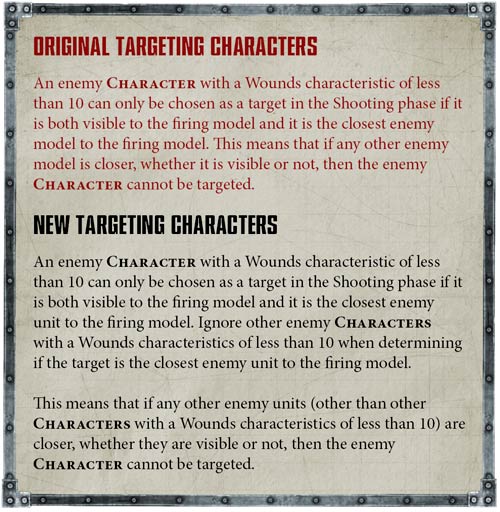
This change from the rulebook with regards to targeting characters is subtle, but in practice, it means two things:
Firstly, you can’t target a character if any enemy unit is closer, even if the enemy unit is not visible. So you can’t purposefully move out of line of sight of other enemy units to “snipe” at characters (you’ll need to leave the character sniping to actual snipers).
The second effect is that characters no longer stop you from targeting other characters. The previous wording of the rule had an odd interaction when used with armies composed primarily of characters, effectively forcing you to always shoot the closest one, removing any kind of targeting choice from players. Characters can still hide from enemy fire, but they will need to do so behind your army’s rank and file troopers, not each other!
Over the past few months, you’ve emailed in literally thousands of questions to our rules inbox, and the Studio rules team have been diligently working through them to get you your answers.
You’ll find the full list in the download, while below we’ve called out some of the key changes that are likely to affect multiple armies: an increase in Command Points, an update to how units are able to ignore wounds, and a quick note on some re-pointing of units.
More Command Points
The rules team have done a great job of giving armies access to a whole host of characterful Stratagems to play with. The only issue was, Command Points were often in short supply, especially for ‘elite’ style armies. So, to reward players who build their lists using the Battalion and Brigade Detachments, we’re offering even more Command Points to these Troop-heavy forces:
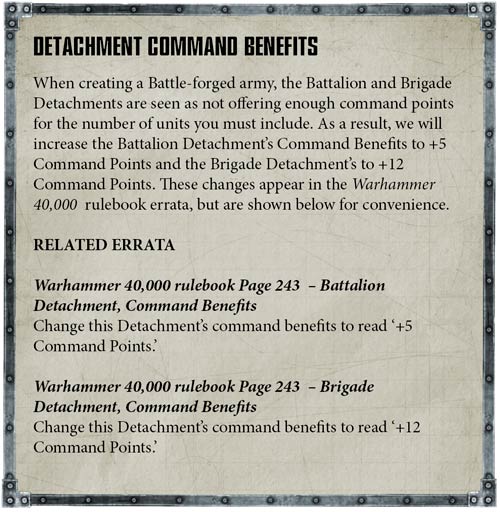
A Battalion previously earned you 3 CP, and that has now been increased to a more respectable 5, while a Brigade moves up from 9 to a hefty 12!
As we said, elite armies will find this change particularly welcome – if you play an army like Space Marines or Adeptus Custodes, you’ll know that filling a Battlefield Role Slot in a Detachment often involves a significant commitment in points or power level, and this change means that you’ll be able to pick up more Command Points for fewer Detachments and fewer units, giving you more freedom over which Stratagems you use.
Ignoring Wounds
There are several units in the game with the ability to ignore wounds, and with the right combination of psychic powers, warlord traits, and abilities, these could be ruthlessly stacked, making models effectively unkillable. (Imagine facing a unit befitting from both the Warlord Trait “Tenacious Survivor” and the Death Guard ability “Disgustingly Resilient”, they’d have an armour save and then two chances to stop any damage on a roll of 6+ and 5+ respectively). As well as being far from how the rules were initially intended, these multiple ‘ignore death’ rolls can really slow down a game. From now on, a model will only get one “ignore” save per wound (whichever is best).
Reviewing Points
Across several matched play events, we’ve seen several units consistently outperform others. We want to balance these units without making them weaker, and so, we’re adjusting their points costs. A comprehensive look at points will be on its way in Chapter Approved 2019, but we had some changes we wanted to introduce before then.
Roboute Guilliman, for example, is now 400 points (up from 385pts in Chapter Approved 2017 Edition) – in line with his traitorous brethren Magnus and Mortarion and better representing the huge impact he has on the battlefield.
Dark Reapers are now 12 points per model before you equip their reaper launchers (taking them up from 27 to 36). This leaves them a solid Heavy Support choice as opposed to the undeniable bargain they’ve been up until now.
Those are the big changes that will affect every player, but there are plenty of others.
There are several FAQs for our codex series, and you can find these over on our FAQs page.
The Datasheet Rule of Three
Over the past year, we’ve been lucky enough to attend a range of tournaments and events, and had the chance to check out what’s happening on the front lines of Warhammer 40,000 gaming – from teams of players who forge thrilling narratives with beautiful armies, to the top tier, hyper-optimised lists used by avid, competitive, matched play fans.
While we’ve seen some interesting lists, one thing we’ve noticed (and been told about) is that a few lists seem to rely on using a single datasheet repeatedly (such as flying Hive Tyrants, and Imperial Assassins). This lends itself to one-dimensional armies that aren’t particularly interesting to play with or against and don’t match the narrative of the setting.
As such, we’re now providing a suggested limit for the number of times a single datasheet can be used in your list for an organised play event:
As the rule doesn’t apply to Troops or Transports, you’ll still be able to build thematic lists, like Space Marines Battle Companies or Drukhari raiding parties, but you won’t be building your entire battleplan around a single supposedly rare or exotic unit (such as Dark Reapers) – you’ll need a combined arms approach, which we’re sure will make for more dynamic and enjoyable games for everyone.
This ruling is designed specifically as a recommendation for events but, like the Detachment limits, you’re welcome to use it in any of your games.
For this next set of proposed changes – we want your help.
We’ve got some interesting ideas on how to balance the game going forward. We were bowled over by the response to our first beta rules, and really appreciate your input, and so, we’re offering you the chance to test the next two as well.
Soup is off the Menu
The first beta rule we’d like to discuss is designed to make matched play armies more interesting and to encourage more focused list building.
When the new edition of Warhammer 40,000 was released, building armies allowed players unprecedented freedom to mix and match within Aeldari, Imperium and Chaos armies. In practice, this has led to some unintended consequences in matched play, with the much-dreaded “soup” lists cherry-picking the best units from each faction to create overly powerful and unthematic armies. The first rule we’re trialling is a change to army building:
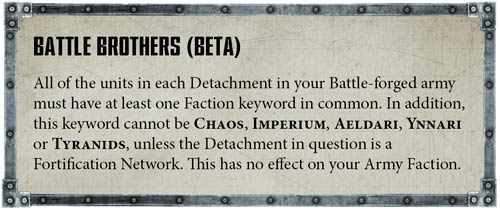
For armies without an HQ choice of their own, worry not! Your Sisters of Silence, Officio Assassinorum et al are all allowed to be fielded in a Vanguard Detachment without one. Likewise, your Ynnari faction leaderscan still be used in Craftworlds, Drukhari and Harlequins detachments.
A Better First Turn
Another topic we’ve had loads of feedback on is the first turn. We’ve seen a certain kind of list consistently over-perform, where several powerful offensive units that either possess deadly close range shooting or can secure a devastating first turn charge allow players to gain a huge amount of momentum very early on without their enemy having a chance to counter-play. To help deal with this, and to make sure games stay interesting for longer, our second beta ruling changes the way that units deploy from Tactical Reserves:
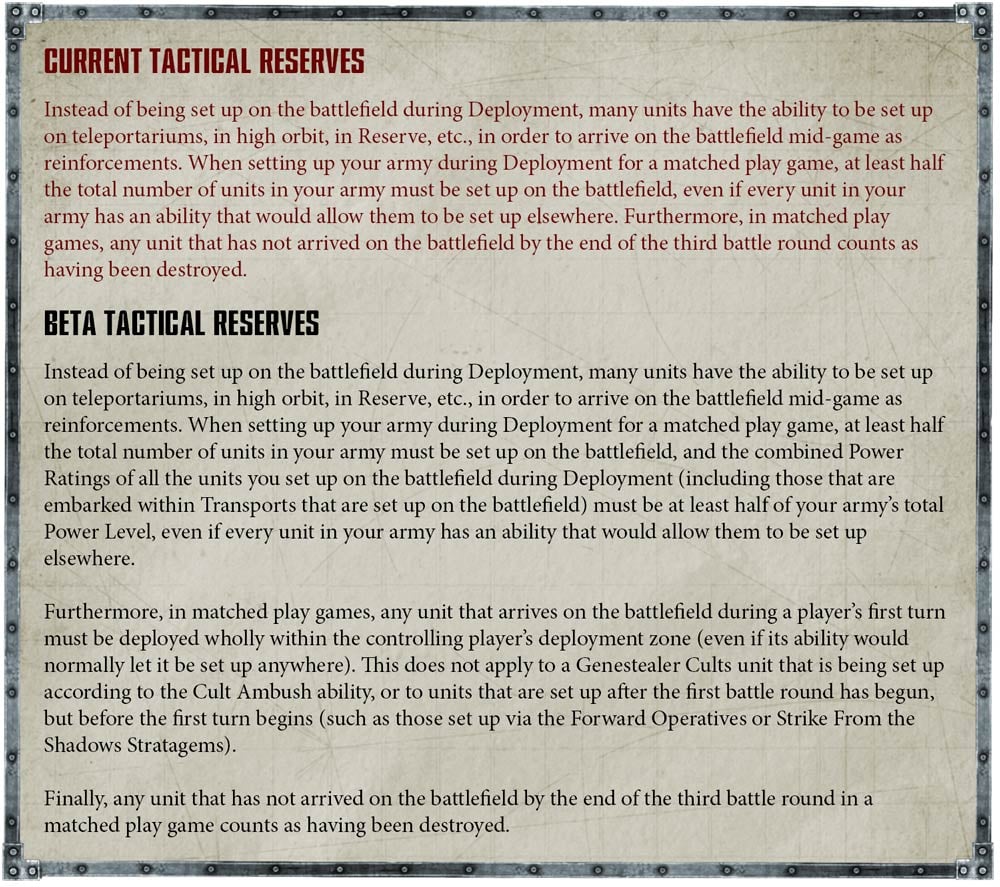
You’ll still be able to use your Tactical Reserves to keep units safe in the first turn, and Stratagems that allow redeployment still have a strong niche but now, to make the best use of your units that deploy from reserves, you’ll have to wait until the second turn. When playing against a list that uses loads of reserves, you’ll have the chance to prepare your strategies, spread out and tackle key elements of the enemy army before they attack.
Play the game. Send us your feedback!
All you need to do to get playing with these rules is download the FAQs and try them for yourself! As always, your feedback is invaluable, and we’d love to hear more from you on 40kFAQ@gwplc.com!

